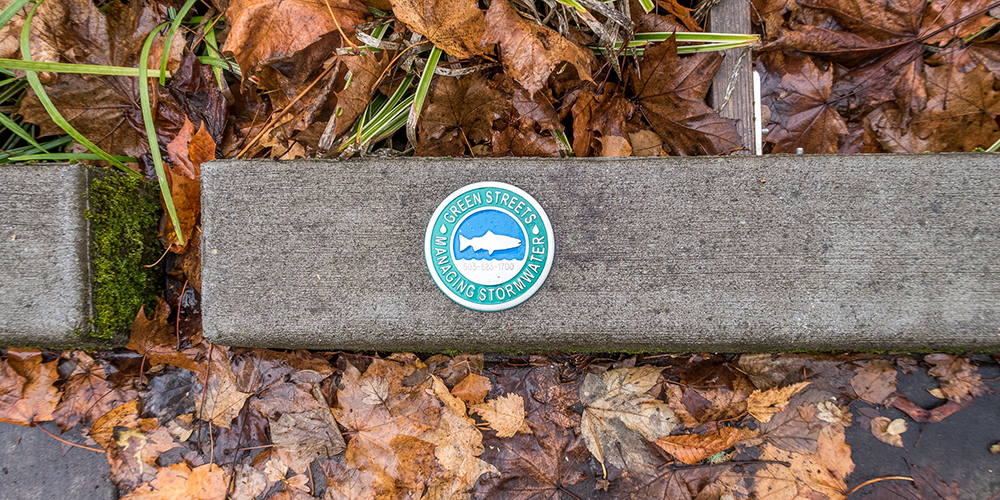What influences local leaders to prioritize green stormwater solutions?
A new study finds that decisionmakers who value environmental protection are most likely to choose green stormwater management tactics
Managing stormwater is an important task for cities — runoff from heavy rain can cause flooding and pollute waterways if not managed properly. There are many ways to control runoff, from underground tanks to rain gardens.
Some options provide extra benefits for cities beyond stormwater management, called “co-benefits.” For example, rain gardens can both replenish groundwater supplies and provide habitat for native insects.
“Cities often use stormwater management regulations as an entry point for broader greening goals, leaving on-the-ground decisions about how that happens to professionals,” said V. Kelly Turner, co-director of the Luskin Center for Innovation. “This indirect approach to land management is more likely to be effective if water professionals prioritize urban greening.”
So how do water managers — such as engineers, public works employees and others who make decisions about water — choose among different stormwater options? In a new study, researchers from UCLA’s Luskin Center for Innovation, UC Davis, Kent State University and Colorado State University surveyed 185 stormwater professionals from Cleveland, Ohio, and Denver, Colorado, to find out.
The study’s findings show two distinct patterns:
1. Top priorities align with federal regulations
While Cleveland’s older combined sewer system mixes sewage and runoff, Denver’s more modern system has separate sewer and runoff management. For this reason, the two cities face different federal regulations. Cleveland must restrict how much water goes into the sewer, while Denver must control how polluted water is upon entering the sewer. Either way, a limited amount of pollution goes into the sewer.
The study finds that water managers seemed to prioritize their city’s federally set goals: Cleveland professionals said that managing the amount of runoff was their main objective, while Denver respondents said they prioritized managing how polluted the runoff is. The authors didn’t directly ask whether the respondents were setting their goals based on EPA regulations, but the results suggest that this may be the case.
2. Co-benefit choices align with personal values
After meeting primary stormwater goals, water managers can choose strategies based on their co-benefits. But to narrow the choices down further, they make more individual judgments. Environmental “champions” — those who think humans should protect the non-human environment — tended to pick options with environmental co-benefits, like urban greening projects. Meanwhile, “traditional technocrats” preferred options with more human-centric co-benefits (such as property value, aesthetics and recreation). This pattern did not differ between the two cities.
So what?
Stormwater management strategies are important for land use planning. Green infrastructure, like rain gardens, can help bring down temperatures, provide green spaces for residents, and bring other environmental and social benefits. The fact that cities are required to manage stormwater can motivate local officials to conduct urban greening — as long as they choose green infrastructure, not gray infrastructure (such as underground tanks and concrete drainage).
So how can policymakers push for more green infrastructure use for stormwater management? Based on these findings, one approach is to hire more water managers who believe in protecting the environment — in short, environmental “champions.”
“Our survey helps show that water managers can be key players in advancing urban greening projects in cities,” said co-author Kyra Gmoser-Daskalakis, a former Luskin Center for Innovation researcher and current doctoral candidate at UC Davis. “Ultimately, these individuals have a chance to advance green infrastructure projects to provide added environmental benefits while meeting their main goal of keeping runoff out of the sewers.”
Learn more
“Champions and Traditional Technocrats: The Role of Environmental Value Orientation in Stormwater Management” was published in the Journal of the American Water Resources Association. The researchers conducted this study as part of the STORMS research project supported by the Luskin Center for Innovation and the National Science Foundation. Through this project, researchers are studying how local stormwater management efforts can contribute to wider environmental protection work.
To learn about other research our experts are conducting, visit our urban greening or water research webpages.








 Moyo Studio / iStock
Moyo Studio / iStock